Related Research Articles

KC and the Sunshine Band is an American disco and funk band that was founded in 1973 in Hialeah, Florida. Their best-known songs include the hits "Get Down Tonight", "That's the Way ", "(Shake, Shake, Shake) Shake Your Booty", "I'm Your Boogie Man", "Keep It Comin' Love","Boogie Shoes", "Please Don't Go", and "Give It Up". The band took its name from lead vocalist Harry Wayne Casey's last name ('KC') and the 'Sunshine Band' from KC's home state of Florida, the Sunshine State. The group had five number one singles on the Billboard Hot 100 chart in the 1970s.

Ella Mae Morse was an American singer of popular music whose 1940s and 1950s recordings mixing jazz, blues, and country styles influenced the development of rock and roll. Her 1942 recording of "Cow-Cow Boogie" with Freddie Slack and His Orchestra gave Capitol Records its first gold record. In 1943, her single "Get On Board, Little Chillun", also with Slack, charted in what would soon become the R&B charts, making her one of the first white singers to do so. Morse stopped recording in 1957 but continued to perform and tour into the 1990s. In 1960 she received a star on the Hollywood Walk of Fame.
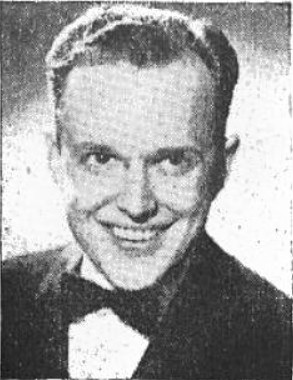
Wilbur Schwichtenberg, known professionally as Will Bradley, was an American trombonist and bandleader during the 1930s and 1940s. He performed swing, dance music, and boogie-woogie songs, many of them written or co-written by Don Raye.
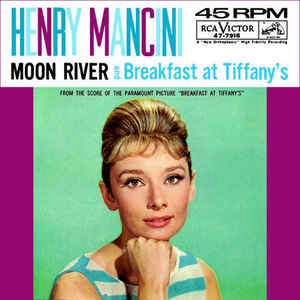
"Moon River" is a song composed by Henry Mancini with lyrics by Johnny Mercer. It was originally performed by Audrey Hepburn in the 1961 film Breakfast at Tiffany's, winning an Academy Award for Best Original Song. The song also won the 1962 Grammy Awards for Record of the Year and Song of the Year. In 1999, Mancini's recording was inducted into the Grammy Hall of Fame.
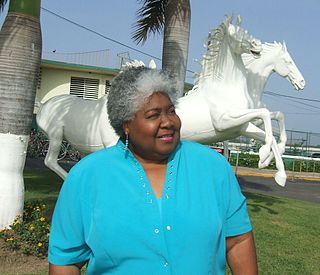
Dorothy Moore is an American blues, gospel, and R&B singer best known for her 1976 hit song, "Misty Blue".
"I'm Walking Behind You" is a popular song which was written by Billy Reid and published in 1953. The recording by American singer Eddie Fisher was a No. 1 hit in both the US and UK Singles charts, but it had previously been recorded by Reid's former partner, Dorothy Squires, who had a hit with the song in the UK.

"(Get Your Kicks on) Route 66" is a popular rhythm and blues song, composed in 1946 by American songwriter Bobby Troup. The lyrics relate a westward roadtrip on U.S. Route 66, a highway which traversed the western two-thirds of the U.S. from Chicago, Illinois, to Los Angeles, California. The song became a standard, with several renditions appearing on the record charts.

"I Can't Stop Loving You" is a popular song written and composed by country singer, songwriter, and musician Don Gibson, who first recorded it on December 3, 1957, for RCA Victor Records. It was released in 1958 as the B-side of "Oh, Lonesome Me", becoming a double-sided country hit single. At the time of Gibson's death in 2003, the song had been recorded by more than 700 artists, most notably by Ray Charles, whose recording reached No. 1 on the Billboard chart.
"Mr. Five by Five" is a 1942 popular song by Don Raye and Gene DePaul, that describes a heavyset man who is "five feet tall and five feet wide". The person highlighted by the song was Jimmy Rushing, the featured vocalist of Count Basie's Orchestra from 1935 to 1948.

"Boogie Woogie Bugle Boy" is a World War II jump blues song written by Don Raye and Hughie Prince which was introduced by The Andrews Sisters in the Abbott and Costello comedy film, Buck Privates (1941). The Andrews Sisters' Decca recording reached number six on the U.S. pop singles chart in the spring of 1941 when the film was in release. The song is ranked No. 6 on Songs of the Century. Bette Midler's 1972 recording of the song also reached the top ten on the U.S. Billboard Hot 100.

Don Raye was an American songwriter, best known for his songs for The Andrews Sisters such as "Beat Me Daddy, Eight to the Bar", "The House of Blue Lights", "Just for a Thrill" and "Boogie Woogie Bugle Boy." The latter was co-written with Hughie Prince.
"You're Nobody till Somebody Loves You" is a popular song written by Russ Morgan, Larry Stock, and James Cavanaugh and published in 1944. The song was first recorded by Morgan and was a hit for him in 1946, reaching the No. 14 spot in the charts. The best known version was Dean Martin's, which was released in 1960 and reissued in 1964.

"Beat Me Daddy, Eight to the Bar" is a song written in 1940 by Don Raye, Hughie Prince, and Ray McKinley. It follows the American boogie-woogie tradition of syncopated piano music.

Alessandro Carmelo "Teddy" Randazzo was an American pop songwriter, singer, arranger and producer, who composed hit songs such as "Goin' Out of My Head", "It's Gonna Take a Miracle", "Pretty Blue Eyes", and "Hurt So Bad" in the 1960s.

Chuck Berry's Golden Decade is a compilation of music by Chuck Berry, released in three volumes in 1967, 1973, and 1974. Covering the decade from 1955 to 1964, each volume consists of a two-LP set of 24 songs recorded by Berry. The first volume reached number 72 on Billboard's Pop Albums chart. The second volume peaked at number 110. The third volume, which included only two hit singles among its tracks, did not chart.
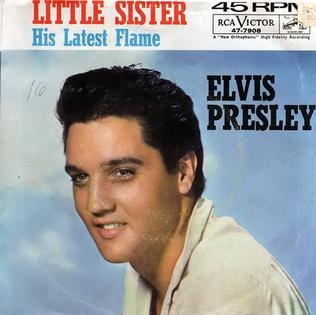
"Little Sister" is a rock and roll song written by Doc Pomus and Mort Shuman. It was originally released as a single in 1961 by American singer Elvis Presley, who enjoyed a No. 5 hit with it on the Billboard Hot 100. The single also reached No. 1 in the UK Singles Chart. Lead guitar was played by Hank Garland and the rhythm guitar was played by Scotty Moore with backing vocals by the Jordanaires featuring the distinctive bass voice of Ray Walker.
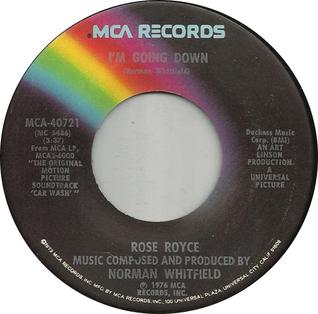
"I'm Going Down" is a song written and produced by Norman Whitfield, and performed by American soul and R&B group Rose Royce in 1976. It is from the film Car Wash and is featured on its soundtrack. In 1994, it was covered by American singer Mary J. Blige.

David Jamahl Listenbee, better known by his stage name GoonRock, is an American record producer, musician, singer, songwriter and rapper. Raised in Los Angeles, California, early in his career he focused on hip hop and sold beats to artists such as Dr. Dre, Ne-Yo, Kanye West, and Juvenile. He later began incorporating club music. GoonRock co-wrote and co-produced a number of songs on LMFAO's 2011 album Sorry for Party Rocking, including hit singles "Party Rock Anthem" and "Sexy and I Know It."

The singles discography of American country music singer Reba McEntire contains 126 singles. They are further categorized by 100 released as a lead artist, seven as a featured artist and 19 that were issued as promotional singles. In addition to singles, eight unofficial singles were released and made charting positions in both the United States and Canada. After being discovered by Red Steagall, McEntire signed a recording contract with Polygram/Mercury Records in 1975. In 1977, she released her debut, self-titled album, which yielded four singles that low-charting entries on the Billboard Hot Country Songs survey. She had her first major hit as a solo artist with a remake of Patsy Cline's "Sweet Dreams" (1979).

American rapper A Boogie wit da Hoodie has released four studio albums, two mixtapes, 33 music videos, four extended plays (EPs) and 49 singles.
References
- ↑ "New Records". Billboard . Vol. 58, no. 19. May 11, 1946. p. 33. ISSN 0006-2510.
- 1 2 Dawson, Jim; Propes, Steve (1992). What Was The First Rock'n'Roll Record?. p. 14-17. ISBN 0-571-12939-0.
- ↑ Larkin, Colin, ed. (1992). The Guinness Encyclopedia of Popular Music (First ed.). Guinness Publishing. p. 1690. ISBN 0-85112-939-0.
- ↑ Whitburn, Joel (2013). Hot Country Songs 1944–2012. Record Research, Inc. p. 28. ISBN 978-0-89820-203-8.
- ↑ Rodman, Melissa C. (March 7, 2016). "Harvard Krokodiloes Celebrate 70th Anniversary". The Harvard Crimson . Retrieved January 5, 2024.